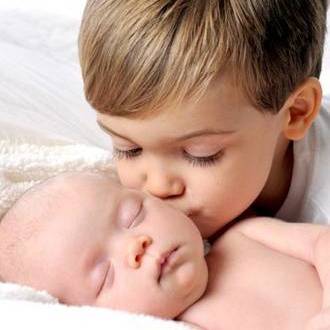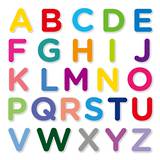Shop
01859
https://www.under5s.co.nz/shop/Hot+Topics+Articles/Child+Development/Managing+the+arrival+of+a+new+sibling.html
Managing the arrival of a new sibling
|
All children react differently to the arrival of a new baby in the family, but there are ways you can help your toddler and pre-schooler to accept their new sibling and still feel special.
|
You might also be interested in ...
Teaching preschoolers the alphabet & letters
Being able to read is a vital life skill, so make the early stages of learning the alphabet as fun as possible for your preschooler. Preschoolers learn and develop best through using their whole body, all of their senses and their natural environments. You’ll find that most preschoolers begin to recognise letters when they’re about 2 to 3 years old, and are able to identify a large number of letters between 4 and 5 years old.
4 Benefits of screen time for preschoolers
It’s not often we associate ‘benefits’ with screen time, but when used in moderation there are some benefits to be had for pre-school kids. It’s all about balance! Find out more about the educational, communication, creative and physical benefits of screen time.
join usJoin us on social media for all our latest news. |
sign upSign up and receive our latest newsletters. |
|







For a toddler or pre-schooler accustomed to your undivided attention, discovering how much time is needed for their new sibling can come as a bit of a shock to them. Not to mention all of the presents the new arrival gets from friends and relatives!
Some toddlers enjoy playing the role of big brother or sister and suddenly seem to grow up, but others find it hard to understand why they have to share their parents.
So, how do you cope with your toddler or pre-schooler on top of your new baby duties?
Behaviour
Attention seeking behaviour is common. Your toddler's or pre-schooler's actions will show how they feel, as at this age they’ll find it hard to communicate through words.If they’re old enough, talk to them about how they're feeling and tell them how much you still love them.
Often the older child will temporarily regress to an earlier stage in their development in an attempt to gain more of your attention. This calls for patience, love and spending time with them.
Involvement
Try to include your toddler in as many of your activities with your baby as possible.Ask their opinion and involve them in your decisions where you can.
Asking them to help with your baby’s care (even if it’s not helpful!), such as fetching nappies or wipes, finding small toys for the baby to play with etc, will make them feel important.
Teach your toddler or pre-schooler how to cuddle, touch and talk to the baby while you watch them.
Share good memories of your older child as a baby.
It’s not always practical for your little one to help out, so put together some small books and games in a special box so that they can sit next to you and play whilst you’re feeding or changing the baby.
Quality time
It’s important to set aside one-on-one time with your toddler or pre-schooler.Perhaps plan things for when your baby is sleeping or ask family or friends to look after your baby so you can spend some quality alone time with your older child.
Play games, go to the park or even do some baking together. Aim to do activities that will encourage you both to communicate and really make the most of your time together.
Routines
Where possible, try to keep your toddler's and pre-schooler's daily routine the same as it was before the baby arrived.From bedtimes routines and nap times to attending daycare or kindy, going to activity classes or catching up with friends on a regular basis. Young children thrive on routines!
Check out our other Hot Topics on:
- Understanding disruptive behaviour
- 10 tips for reducing tantrums
- 9 ways to help stop the whinging
Image source: rootedforlife.wordpress.com